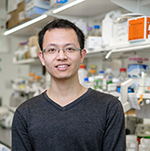Q&A with Xiaotao Wang

How did you first hear about the Institute for Artificial Intelligence in Medicine?
I heard about the Institute for Artificial Intelligence in Medicine through Northwestern email/News Center of Northwestern Medicine, when it was established in March 2020.
What factors interested you to start working with your mentor, Dr. Feng Yue?Back in 2018 when I searched for postdoctoral positions, to evaluate the contributions/impact of each lab/PI in the field of 3D genomics, I built a collaboration network using publication records from Web of Science. Each node in this network represented a PI/lab, and each edge represented the co-authorship relationship between two PIs. The node color and size encoded the number of publications and the number of citations, respectively, and the edge width encoded the number of co-authored works. Based on this network, I was able to rank labs/PIs by their centrality in the network, total citations, and total number publications. Dr. Yue was ranked top 20 in the world. In addition to the network features, I was also attracted by innovative computational methods developed by Dr. Yue’s lab, such as HiCplus and HiCRep.
How have your experiences with I.AIM and Dr. Yue changed you?
I really learned a lot from my work experiences with Dr. Yue. Instead of a supervisor, Dr. Yue is more like an older brother or friend to me. He is an efficient person. I learn from him how to manage time, and how to cut losses in the beginning. He is an optimistic person, and often helps me out when I face troubles in my projects. Additionally, Dr. Yue often asks the lab members to give a brief presentation on their project, and he often emphasizes the importance of oral presentation: "A presentation is an opportunity for you to think about your projects and important questions in the field. Can you summarize your project or a paper or whatever in three sentences? If you can’t, then you don’t really understand it." In the past a few years, I have been keeping this in mind, and that helps me read papers critically and also find the right path in my own project more quickly.
Can you share your bio so we can learn a little more about your background?
Dr. Xiaotao Wang obtained his B.S. degree in Biotechnology and Ph.D. degree in Bioinformatics from Huazhong Agricultural University in 2013 and 2017, respectively. Since August 2018, he has been a postdoctoral fellow in Dr. Feng Yue’s lab in the Department of Biochemistry and Molecular Genetics in Feinberg School of Medicine at Northwestern University, with a focus on developing computational tools to study the impact of genomic variants on transcriptional, epigenetic, and 3D genomic changes during tumorigenesis. He is known for developing a series of software for 3D genomics and cancer genomics communities, including EagleC, NeoLoopFinder, Peakachu, runHiC, TADLib, HiCPeaks, pairLiftOver, etc.